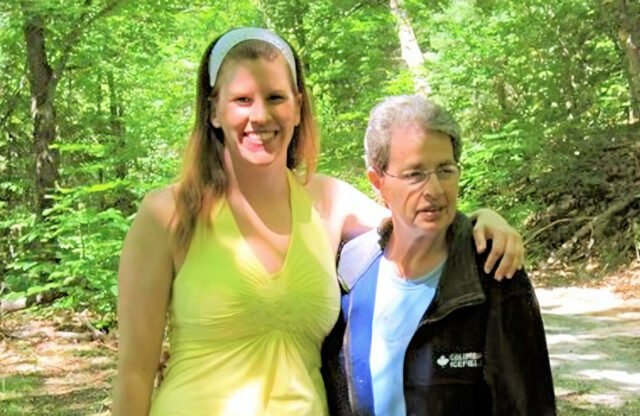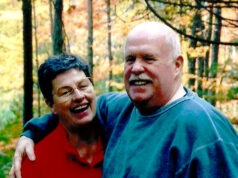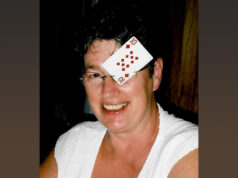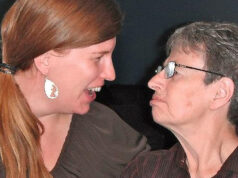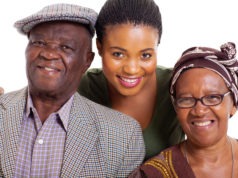Lianna Marie, author of ”The Complete Guide for People With Parkinson’s Disease and Their Loved Ones” and the upcoming book ”The Parkinson’s Path,” joins Suzanne to talk about the shared path families experience when a loved one gets a chronic diagnosis. Initially, there’s denial. Lianna says what we often don’t think about isn’t about the loved one’s feeling of denial, but caregivers as well. “I thought I could “save” her from Parkinson’s,” she confesses about having denial, “not that I could make it go away, but I could make things a lot easier. I’ll put it on my shoulders. But I wasn’t able to do that.”
Lianna explains, “People often come to me and say, my husband’s in denial about his Parkinson’s disease, and I ask for clarification, and they say, he doesn’t want to get any help. But sometimes this is how some people adapt to a diagnosis, they need time. How long? Depends on each person. As caregivers and loved ones, we need to give them some time and space for that. Lianna explains the differences between adaptive and maladaptive behaviors. Part of caregiver acceptance is to give them respect and allow them time to process the diagnosis, support them by asking them how we can be there for them rather than trying to take charge.
Learn more at Lianna’s website, All About Parkinson’s.
Welcome everyone to Answers for Elders Radio network and we are here in a brand new year of 2023 all kinds of exciting things happening on our platform on podcast as well as about to air going nationwide starting March 4th. But I am here, we’re going to talk today about a very important concept, because a lot of us may have situations in our lives where we have either received in a huge, devastating diagnosis or we have a loved one who has done that and you know, in talking about that, I really believe that there’s any sort of terminal illness that happens in a family, whatever that is. Um it’s it’s a process that everyone lives with and it’s part of the grief process. I am here with Leanna Marie, and for those of you that remember her, she’s been on our show many times and we’re excited to have Leanna with us. She is the author of the complete guide for people with Parkinson’s disease and their loved ones. Everything you need to know about caregiving for Parkinson’s and the upcoming book The Parkinson’s Path. Leanna, welcome to Answers for Elders Radio.
Leanna Marie: Thanks you, Suzanne, it’s great to be here,
Suzanne: You know, you went through your own story with your mom, obviously you know you have went through this process and you know, I’m sure just like me realizing I was kind of in denial at the beginning, like I didn’t really know what was happening and there was a part of me that thought my mom was, nothing was ever going to happen to her. And then all of a sudden she got dementia. Your mom got Parkinson’s, tell me a little bit about that denial feeling. Can can you identify that at all?
Leanna Marie: Yeah. You know, it’s funny because you always think of, it’s the people that have the illness that might go through denial. And, when a lot of care partners ask me, how do I deal with my loved one who’s, who’s in denial, whatever, But what we don’t think about is, us as care partners that sometimes we might be in denial., and I probably didn’t realize it until later on in mom’s illness., like I’ve said before, she had 30 years with Parkinson’s eight of the last eight, she had dementia and I think the denial, if you want to call it that for me, I think I was in denial about being in denial. I still even have a hard time saying it, but I have a little little bit of space now from that time and I would say that I was a lot of it was, I was, I thought I could quote unquote safer from Parkinson’s like, I could not that I could make it go away, but that I could, make things a lot easier, which I definitely tried to do, but I think I sort of thought I would be her savior and and that, you know, don’t worry mom, I got this, you know, um I’ll put it on my shoulders and and then realizing later on that, in fact, I couldn’t, I couldn’t do all
Suzanne: that. So I had an aunt once that was dying of cancer. She did pass away from cancer. I would talk to her and she’d say, um I’d say something like doctor wanted to put her on hospice and she said, no, that’s for people that are dying, I’m not dying, I’m gonna, you know, so that was, I understand that there’s this side of that, you know, positive and we definitely want to fight every day to make that quality of life better and ultimately the miracle would be the cure, but in the same time, there’s a factor that, you know, to be in complete denial of a situation. There’s this, there’s this process of, you know, it can’t be happening to me. It’s not, it’s not part of my life, it’s, you know, it’s, I don’t need to to deal with this right now. Um there’s all kinds of things of putting things off, I think when people know that there’s things that happen and then, you know, they really should go to the doctor because they have maybe a lump or uh, you know, a certain kind of situation, but then they end up not dealing with it because they don’t wanna they don’t want to accept it. They don’t want to face it
Leanna Marie: and that happens a lot of people with Parkinson’s, well, any illness as you mentioned cancer., but in, in my mom’s case, you know, I think, and and this is why I asked, I mentioned earlier was that people ask me often about this, my husband, it’s it’s often my husband’s in denial about his Parkinson’s disease. And I’ll say, okay, how do you define that? And oh, he doesn’t want to get any help. To which I say, well, let’s start with the beginning. Here are you, are you saying, you know, because we assume that we know best for our loved one, but we might not. And like you said, sometimes it’s just needing some time. Some people, this is how they adapt to a diagnosis. They need time to digest that diagnosis. How long that is, depends on each person. And, and that’s not a bad part of a bad behavior. They’re just, you know, they’re adjusting to the diagnosis. And so we need as care partners and loved ones, we need to give them some time and space for that and not instantly go, you’re in denial. You have, you know, that kind of thing. Um And I think so this idea of a friend of mine who’s a psychologist said, you know, is their behavior adaptive or maladaptive. So in other words, if they if they’re going downhill, they’re starting to get into a behavior such as for example, Michael J Fox talks about drinking a lot, you know, when he got his diagnosis and obviously we know that drinking in excess is not is not a adaptive behavior. That would be right. So, so let’s look at how is that our loved one coping. Um and and just saying that I don’t have the disease right away isn’t necessarily horrible, but we do obviously want to help them get treatment, but how do we do that? We support them. We love them. We ask them, how can we be there for them? We don’t go you don’t need to go to the doctor, you know, it’s easier said than done sometimes, but that would be my recommendation for someone who says they’re in denial.
Suzanne: Yeah. And I think that what you’re saying too is so important and the fact that we as care partners tend to want to take control of the situation. I know I tried to do that with my mom. I was constantly on the Internet. I was trying to you know, outsmart things. I was constantly talking to people that, you know, in her care community with her doctor to the point where I would sometimes talk over her. Um and I went to came to a realization that was kind of this overwhelming realization that, you know, it’s mom’s life, he’s going to make decisions based on what’s best for her, it may not be my choice because obviously I wasn’t the one that, you know, that chose that, but it’s her life and I think part of, you know, our acceptance is care partners. I mean I’m throwing that out there is the respect of where they’re at and accepting that.
Leanna Marie: That’s where they’re at and I need to hold my tongue sometimes I need to let them and that whole acceptance peace and and that’s and that’s, you know, from denial to acceptance. We learned to then say, you know, in my mom’s case when she finally was got past the digesting, I have Parkinson’s if you will, she then was able to then go look for for more ways to help herself. So not only was she getting treatment through her neurologist, but she was also looking for ways that she could take ownership of her life to exercise more to get the proper nutrition and that because she had accepted, okay Parkinson’s is there, it’s in my life. I don’t need to like it. No one said you had to like it, we’re just going to acknowledge that it’s there and that way we can move forward with our, you know, overall treatment, everything that we can do to make our life better.
Suzanne: And I think to when you’re, when you’re talking about this accepting it and Parkinson’s is there it’s also sometimes letting them, you know, in that conversation be where they’re at. Just just like we’re saying just close your mouth, it’s it’s being that person that says, you know mom, I’m here for you whatever you need. And you know, when you look at if you have a loved one that’s been diagnosed with Alzheimer’s or dementia or diabetes or heart disease or anything like that, that is a coup
Suzanne: Chronic condition. You know, there is a process. I know I have a family member that just got diagnosed with type two diabetes and for the first, you know, they had so many denials. You know, the doctor kept warning him you’re pre-diabetic, you’re pre-diabetic and he didn’t do anything about it, right? It’s because we all have our process and you know, he didn’t even tell his family that he was pre-diabetic. So what were we were doing? We weren’t doing anything to support him, you know, in his process. So now it’s a good thing in that factor to be that voice to say, you know, say saying to them, you know, I’m here for you whatever you need. So Leanna tell us quick tell us about your books. We have about 15 seconds to go. And so you have three books, is that correct?
Leanna Marie: Yes. And so if you’re at the beginning of your Parkinson’s journey, I recommend the complete guide for people with Parkinson’s um caregiving, if you’re in that space then I recommend the everything you need to know about caregiving for Parkinson’s disease and then my new book Parkinson’s Path, which is coming out soon. Um we’ll be, we’re talking about the whole emotional journey that one experiences, both as a person with Parkinson’s and a care partner.
Suzanne: Great, and how do we reach you?
Leanna Marie: Oh well you can go just go on over to all about Parkinson’s dot com and we got a lot of free resources and you can contact me through there as well.
Suzanne: Great and Leanna and I will be back a little bit more about this process, this grief process. Right after this.






